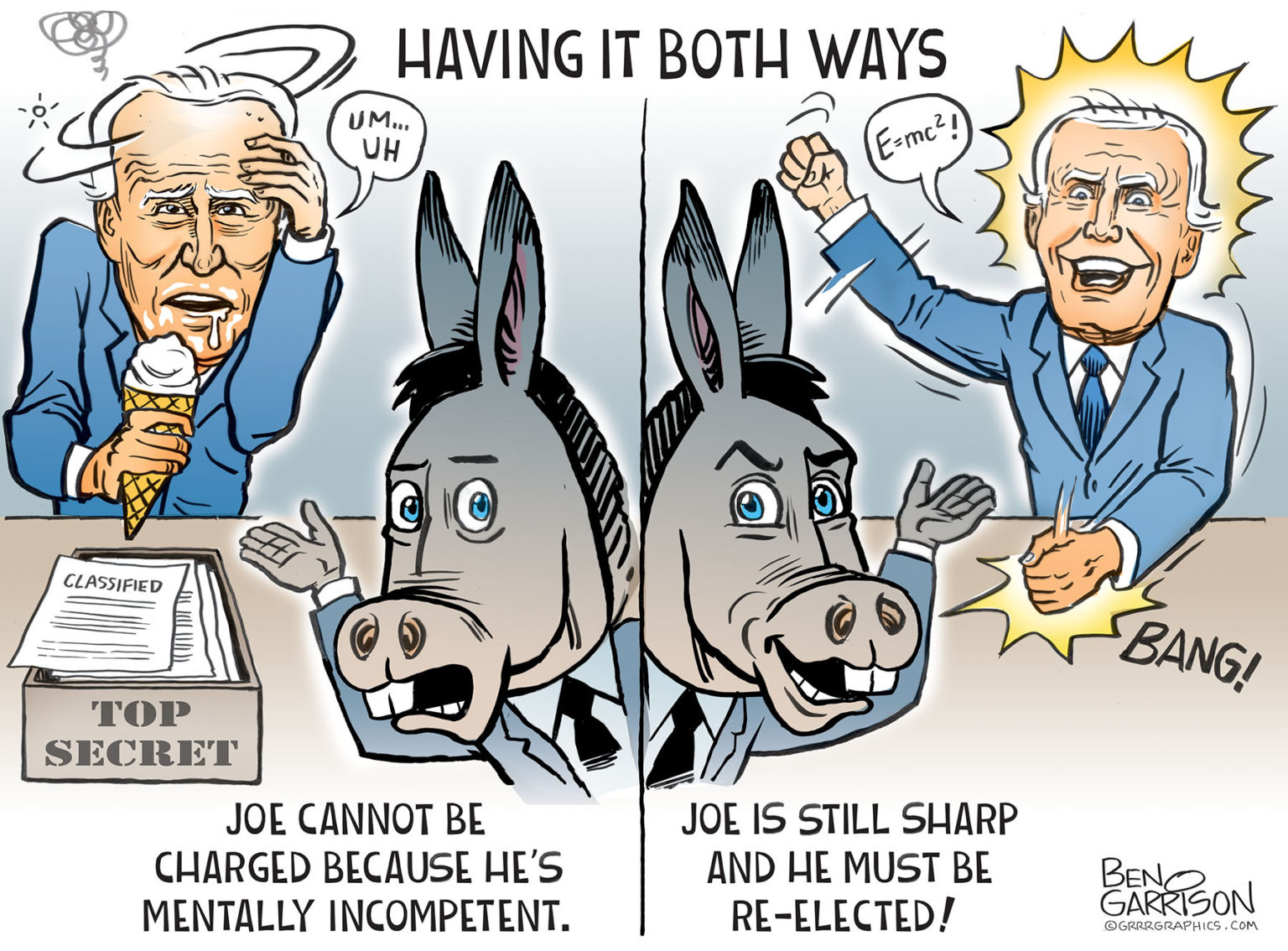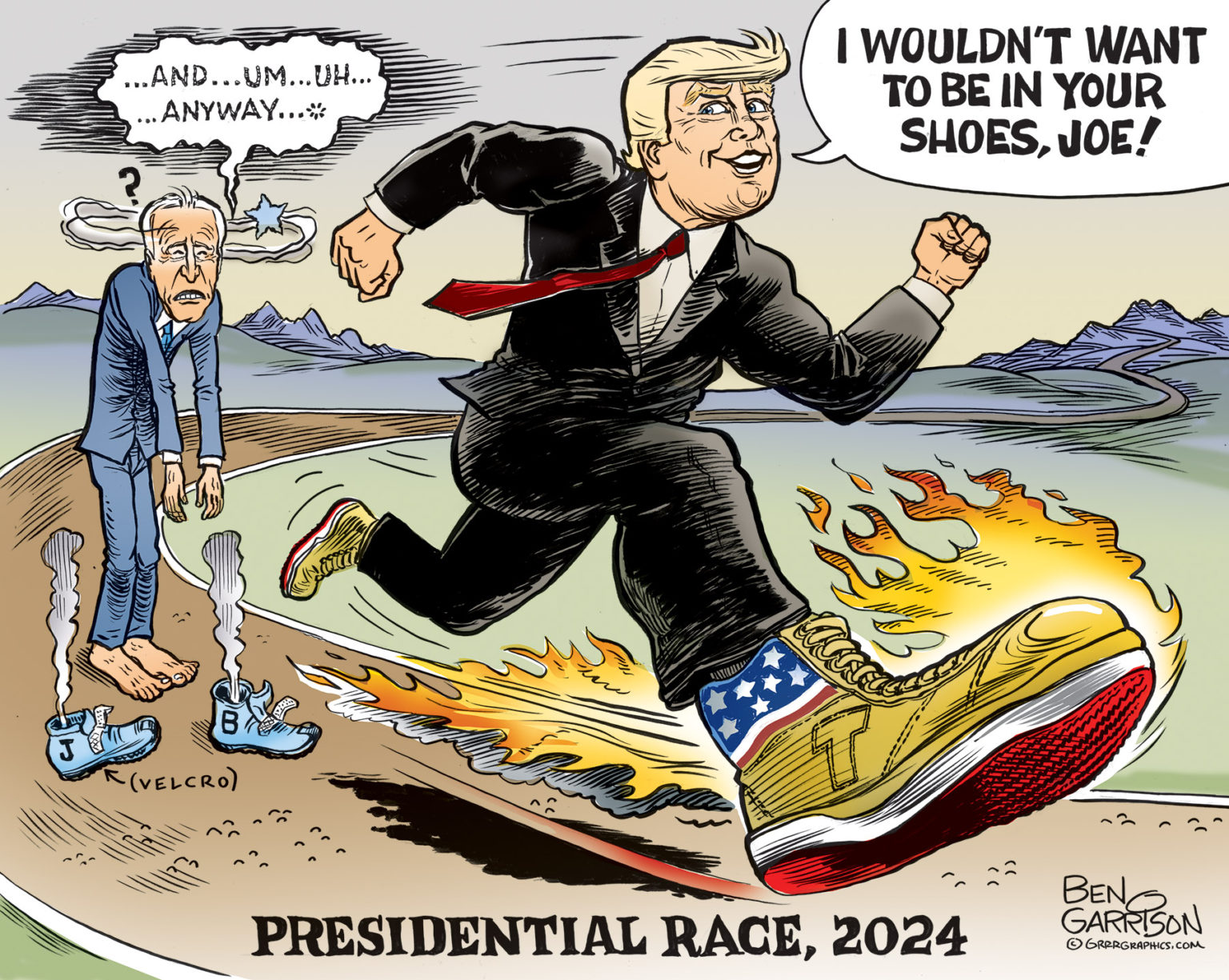https://gellerreport.com/2024/04/anyone-who-cant-recognize-flaws-in-2020-is-unfit-to-help- republicans-win.html/?lctg=99513919
People
Circles
Posts
LIFE IN PRISON FOR RHINO ANTI AMERICAN BASS TURDS,,,REMOVE THERE CITIZENSHIP,,,DEPORT THERE FAMILIES,,MILLIONS IN FINES FOR EACH RHINO BASS TURDS..
If Republicans allow the political persecution of Trump to defeat him it will never stop - American Thinker https://www.americanthinker.com/blog/2024/02/if_republicans_allow_the_political_persecution_of_trump_to_defeat_him_it_will_never_stop.html
If Republicans allow the political persecution of Trump to defeat him it will never stop
This string of blogsfrom the Daily Mail has an item that says that one thirdof Republicans think that President Trump would be unfit for office if he is convicted of anything. The Edison Research poll showed 32 percent of South ...
www.americanthinker.com
Share
If Republicans allow the political persecution of Trump to defeat him it will never stop
If Republicans allow the political persecution of Trump to defeat him it will never stop
This string of blogs from the Daily Mail has an item that says that one-third of Republicans think that President Trump would be unfit for office if he is convicted of anything. The Edison Research poll showed 32 percent of South Carolina GOP p...
www.americanthinker.com
DEMOCRATS CAN’T HAVE IT BOTH WAYS
Cartoon published 02/28/2024
“…We are faced with a staggering contradiction.”
— Mr. Spock, Star Trek’s “Spectre of The Gun”
The Report of Special Counsel Robert Hur was devastating to Biden. It concluded he broke the law by keeping boxes of classified documents in his garage (kept handy to sell to communist China). However, the Counsel also reported Biden was mentally unfit to stand trial. That’s how he got off the hook. Swamp-dwelling Democrats always get off the hook.
Joe was never all that sharp, but the report is correct. Joe was already struggling when he was installed as president, but now everyone can see the marked decline—and it will only get worse from here on out. He slurs his words and forgets world leaders. If he does remember a leader, it’s one from 20 years ago. Joe is an embarrassment to his office and the world is laughing, yet the Democrats are running him for another term. They have no one else. Hence they are forced to pretend he’s A-OK, ship-shape, and on top of things. They say he’s working hard and mentally sound.
Is the Hur Report incorrect, then? The Democrats can’t have it both ways.
Everyone ages differently and Trump has taken care of himself—he would destroy Biden in a debate. Trump can talk for hours without notes. Even with handfuls of notes Joe remains addle-brained. So there will be no debate. Joe without notes or a teleprompter? We all know what happens—he quickly derails and tells non-sequitur stories from his past, which are mostly proven lies but he tells them over and over again anyway. People who are Joe’s age tend to repeat themselves.
Once again, Joe’s campaign trail will consist of his basement. Pushing Joe from state to state with a hectic schedule amounts to elder abuse, so it will again be a Potemkin campaign—only this time without the Covid excuse. The left wing establishment media will spew out pro-Joe propaganda at an even faster rate. They’ll tell us how wonderful Joe’s economy is, but mostly they’ll attack Trump. Look for the liars to say it’s Trump who is mentally unfit and how Biden is as sharp as a tack.
The Democrats must find another candidate—and soon. Let the old corrupt liar retire to his beach house and eat his ice cream. Biden is clearly finished, no matter how hard the Democrats try to keep him propped up while they steal another election for him.
To expect another term from Joe is illogical.
— Ben Garrison
Videos
Find your people at https://Unjected.com
Get your Spike Support from The Wellness Company at https://DestroySpike.com. Use Promo Code UNJECTED anywhere on the site (https://TWC.health) for 10% off!
Unjected Show Bonus Episodes: https://TheUnjectedShow.Substack.com
Check out the Unjected Substack at https://Unjected.substack.com
Joining us tonight is Culture Jammer/Rapper Alex Strenger, who has been a thorn in the side of the establishment for a long time, interrupting city council meetings and some great man-on-the-street videos. Follow him here:
https://twitter.com/TheAlexStrenger
Tune in to The Unjected Show every Friday night at 9pm EST at https://Rumble.com/c/TheUnjectedShow. Call in LIVE at 1-833-3UNJECT. The Unjected Show, brought to you by Unjected.com, is hosted by Unjected Co-Founders Shelby Thomson and Heather Pyle, along with Scott Armstrong (https://LibertyLinks.io/Rebunked) and the hilarious Zach Brown from The Unfit Statesman Podcast (On Podcast Players and Rokfin)
Follow the show on IG: https://Instagram.com/TheUnjectedShow
Unjected on IG: https://Instagram.com/UnjectedOfficial
Twitter: https://Twitter.com/Unjected
Telegram Channel: https://t.me/TheUnjected
Telegram Chat: https://t.me/Unjected_official
Follow Shelby on IG: https://Instagram.com/UnjectedShelby_
Follow Heather on IG: https://Instagram.com/UnjectedHeather
Follow Scott:
Links: https://LibertyLinks.io/Rebunked
IG: https://Instagram.com/Rebunkednews
Twitter: https://twitter.com/Rebunkednews
Follow Zach:
IG: https://Instagram.com/UnfitStatesman
Twitter: https://Twitter.com/UnfitStatesman
Stay Natural. Stay Free. Stay Unjected.
Find your people at https://Unjected.com
Get your Spike Support from The Wellness Company at https://DestroySpike.com. Use Promo Code UNJECTED anywhere on the site (https://TWC.health) for 10% off!
Unjected Show Bonus Episodes: https://TheUnjectedShow.Substack.com
Check out the Unjected Substack at https://Unjected.substack.com
Joining us this evening is Alec Zeck from The Way Forward. He has recently released an epic online seminar called "The End Of Covid" that seeks to deal the final deathblow to the corrupt medical establishment that has seized an undue amount of power in our lives.
Follow and support:
https://TheEndOfCovid.com
https://thewayfwrd.com
Catch The Unjected Show every Friday night at 9pm EST at https://Rumble.com/c/TheUnjectedShow. Call in LIVE at 1-833-3UNJECT. The Unjected Show, brought to you by Unjected.com, is hosted by Unjected Co-Founders Shelby Thomson and Heather Pyle, along with Scott Armstrong and the hilarious Zach Brown from The Unfit Statesman Podcast
Follow the show on IG: https://Instagram.com/TheUnjectedShow
Unjected on IG: https://Instagram.com/UnjectedOfficial
Twitter: https://Twitter.com/Unjected
Telegram Channel: https://t.me/TheUnjected
Follow Shelby on IG: https://Instagram.com/UnjectedShelby_
Follow Heather on IG: https://Instagram.com/UnjectedHeather
Follow Scott:
Links: https://LibertyLinks.io/Rebunked
Twitter: https://twitter.com/Rebunkednews
Follow Zach:
IG: https://Instagram.com/UnfitStatesman
Twitter: https://Twitter.com/UnfitStatesman
Stay Natural. Stay Free. Stay Unjected.
Find your people at https://Unjected.com
Get your Spike Support from The Wellness Company at https://DestroySpike.com. Use Promo Code UNJECTED anywhere on the site (https://TWC.health) for 10% off!
Unjected Show Bonus Episodes: https://TheUnjectedShow.Substack.com
Check out the Unjected Substack at https://Unjected.substack.com
Joining us tonight is Rob Dew, Senior Producer at Infowars, who is fighting the globalists on the frontlines of the Information War, hitting the barb wire so the rest of us can crawl over the top to do our part to tackle the anti-human death cult. No media outlet has withstood as much outrage and attacks with everything from Antifa to the Justice Department of the United States. But tonight we are gonna kick back and have fun chatting about Date Night! Looking forward to hearing from you!
Follow and Support Infowars at:
https://Infowars.com
https://BANNED.video
https://InfowarsStore.com
Follow the show on IG: https://Instagram.com/TheUnjectedShow
Unjected on IG: https://Instagram.com/UnjectedOfficial
Twitter: https://Twitter.com/Unjected
Telegram Channel: https://t.me/TheUnjected
Telegram Chat: https://t.me/Unjected_official
Follow Shelby on IG: https://Instagram.com/UnjectedShelby_
Follow Heather on IG: https://Instagram.com/UnjectedHeather
Follow Scott:
Links: https://LibertyLinks.io/Rebunked
IG: https://Instagram.com/Rebunkednews
Twitter: https://twitter.com/Rebunkednews
Follow Zach:
IG: https://Instagram.com/UnfitStatesman
Twitter: https://Twitter.com/UnfitStatesman
Stay Natural. Stay Free. Stay Unjected.
People
Circles
Videos
Find your people at https://Unjected.com
Get your Spike Support from The Wellness Company at https://DestroySpike.com. Use Promo Code UNJECTED anywhere on the site (https://TWC.health) for 10% off!
Unjected Show Bonus Episodes: https://TheUnjectedShow.Substack.com
Check out the Unjected Substack at https://Unjected.substack.com
Joining us tonight is Culture Jammer/Rapper Alex Strenger, who has been a thorn in the side of the establishment for a long time, interrupting city council meetings and some great man-on-the-street videos. Follow him here:
https://twitter.com/TheAlexStrenger
Tune in to The Unjected Show every Friday night at 9pm EST at https://Rumble.com/c/TheUnjectedShow. Call in LIVE at 1-833-3UNJECT. The Unjected Show, brought to you by Unjected.com, is hosted by Unjected Co-Founders Shelby Thomson and Heather Pyle, along with Scott Armstrong (https://LibertyLinks.io/Rebunked) and the hilarious Zach Brown from The Unfit Statesman Podcast (On Podcast Players and Rokfin)
Follow the show on IG: https://Instagram.com/TheUnjectedShow
Unjected on IG: https://Instagram.com/UnjectedOfficial
Twitter: https://Twitter.com/Unjected
Telegram Channel: https://t.me/TheUnjected
Telegram Chat: https://t.me/Unjected_official
Follow Shelby on IG: https://Instagram.com/UnjectedShelby_
Follow Heather on IG: https://Instagram.com/UnjectedHeather
Follow Scott:
Links: https://LibertyLinks.io/Rebunked
IG: https://Instagram.com/Rebunkednews
Twitter: https://twitter.com/Rebunkednews
Follow Zach:
IG: https://Instagram.com/UnfitStatesman
Twitter: https://Twitter.com/UnfitStatesman
Stay Natural. Stay Free. Stay Unjected.
Find your people at https://Unjected.com
Get your Spike Support from The Wellness Company at https://DestroySpike.com. Use Promo Code UNJECTED anywhere on the site (https://TWC.health) for 10% off!
Unjected Show Bonus Episodes: https://TheUnjectedShow.Substack.com
Check out the Unjected Substack at https://Unjected.substack.com
Joining us this evening is Alec Zeck from The Way Forward. He has recently released an epic online seminar called "The End Of Covid" that seeks to deal the final deathblow to the corrupt medical establishment that has seized an undue amount of power in our lives.
Follow and support:
https://TheEndOfCovid.com
https://thewayfwrd.com
Catch The Unjected Show every Friday night at 9pm EST at https://Rumble.com/c/TheUnjectedShow. Call in LIVE at 1-833-3UNJECT. The Unjected Show, brought to you by Unjected.com, is hosted by Unjected Co-Founders Shelby Thomson and Heather Pyle, along with Scott Armstrong and the hilarious Zach Brown from The Unfit Statesman Podcast
Follow the show on IG: https://Instagram.com/TheUnjectedShow
Unjected on IG: https://Instagram.com/UnjectedOfficial
Twitter: https://Twitter.com/Unjected
Telegram Channel: https://t.me/TheUnjected
Follow Shelby on IG: https://Instagram.com/UnjectedShelby_
Follow Heather on IG: https://Instagram.com/UnjectedHeather
Follow Scott:
Links: https://LibertyLinks.io/Rebunked
Twitter: https://twitter.com/Rebunkednews
Follow Zach:
IG: https://Instagram.com/UnfitStatesman
Twitter: https://Twitter.com/UnfitStatesman
Stay Natural. Stay Free. Stay Unjected.
Find your people at https://Unjected.com
Get your Spike Support from The Wellness Company at https://DestroySpike.com. Use Promo Code UNJECTED anywhere on the site (https://TWC.health) for 10% off!
Unjected Show Bonus Episodes: https://TheUnjectedShow.Substack.com
Check out the Unjected Substack at https://Unjected.substack.com
Joining us tonight is Rob Dew, Senior Producer at Infowars, who is fighting the globalists on the frontlines of the Information War, hitting the barb wire so the rest of us can crawl over the top to do our part to tackle the anti-human death cult. No media outlet has withstood as much outrage and attacks with everything from Antifa to the Justice Department of the United States. But tonight we are gonna kick back and have fun chatting about Date Night! Looking forward to hearing from you!
Follow and Support Infowars at:
https://Infowars.com
https://BANNED.video
https://InfowarsStore.com
Follow the show on IG: https://Instagram.com/TheUnjectedShow
Unjected on IG: https://Instagram.com/UnjectedOfficial
Twitter: https://Twitter.com/Unjected
Telegram Channel: https://t.me/TheUnjected
Telegram Chat: https://t.me/Unjected_official
Follow Shelby on IG: https://Instagram.com/UnjectedShelby_
Follow Heather on IG: https://Instagram.com/UnjectedHeather
Follow Scott:
Links: https://LibertyLinks.io/Rebunked
IG: https://Instagram.com/Rebunkednews
Twitter: https://twitter.com/Rebunkednews
Follow Zach:
IG: https://Instagram.com/UnfitStatesman
Twitter: https://Twitter.com/UnfitStatesman
Stay Natural. Stay Free. Stay Unjected.
Find your people at https://Unjected.com
Get your Spike Support from The Wellness Company at https://DestroySpike.com. Use Promo Code UNJECTED anywhere on the site (https://TWC.health) for 10% off!
Unjected Show Bonus Episodes: https://TheUnjectedShow.Substack.com
Check out the Unjected Substack at https://Unjected.substack.com
Joining us this evening is Foster Coulson, the Founder of The Wellness Company, and his wife Steph. As a partner with TWC, we are excited to talk about the future of Unjected and how TWC is helping to build a parallel medical system.
Check out TWC at:
https://TWC.health
https://twccanada.health/
TWC Socials:
IG: https://www.instagram.com/twc.health | https://www.instagram.com/twccanada.health
Twitter: https://twitter.com/twc_health | https://twitter.com/TWCCanadaHealth | https://twitter.com/FosterCoulson
Tune in to The Unjected Show every Friday night at 9pm EST at https://Rumble.com/c/TheUnjectedShow. Call in LIVE at 1-833-3UNJECT. The Unjected Show is brought to you by Unjected.com
Follow the show on IG: https://Instagram.com/TheUnjectedShow
Unjected on IG: https://Instagram.com/UnjectedOfficial
Twitter: https://Twitter.com/Unjected
Telegram Channel: https://t.me/TheUnjected
Telegram Chat: https://t.me/Unjected_official
Follow Shelby on IG: https://Instagram.com/UnjectedShelby_
Follow Heather on IG: https://Instagram.com/UnjectedHeather
Follow Scott:
Links: https://LibertyLinks.io/Rebunked
IG: https://Instagram.com/Rebunkednews
Twitter: https://twitter.com/Rebunkednews
Follow Zach:
IG: https://Instagram.com/UnfitStatesman
Twitter: https://Twitter.com/UnfitStatesman
Stay Natural. Stay Free. Stay Unjected.
Come find your people at https://Unjected.com
Get your Spike Support from The Wellness Company at https://DestroySpike.com. Use Promo Code UNJECTED anywhere on the site (https://TWC.health) for 10% off.
Check out the NEW Unjected Substack at https://Unjected.substack.com
Joining us tonight is Maj Toure, the Founder of Black Guns Matter, which educates people in urban communities in all 50 states on their 2nd amendment rights and responsibilities through firearms training and education. Maj has been a fierce advocate for medical freedom and has been very outspoken against the affront to human liberty worldwide.
Follow and Support Black Guns Matter:
https://blackgunsmatter.myshopify.com/
Maj Toure Twitter: https://twitter.com/MajToure999
Black Guns Matter: https://twitter.com/blkgunsmattr
Tune in to The Unjected Show every Friday night at 9pm EST at https://rumble.com/c/TheUnjectedShow. Call in LIVE at 1-833-3UNJECT or 1-833-386-5328.
The Unjected Show, brought to you by Unjected.com, is hosted by Unjected Co-Founders Shelby Thomson and Heather Pyle, along with Scott Armstrong from Rebunked News (Rebunked.news) and the hilarious Zach Brown from the Unfit Statesman Podcast (On all podcast players and Rokfin).
Check out the Unjected Substack: https://Unjected.substack.com
Follow the show on IG: @TheUnjectedShow
Follow Unjected Official on IG: @Unjectedofficial
Twitter: @Unjected
Telegram Channel: t.me/TheUnjected
Telegram Chat: t.me/UnjectedChat
Follow Shelby on Instagram: @UnjectedShelby_
Follow Heather on Instagram: @Unjectedheather
Follow Scott: Links: LibertyLinks.io/Rebunked | Twitter: @Rebunkednews IG: @Rebunkednews
Follow Zach: Twitter: @UnfitStatesman IG: @UnfitStatesman
Stay Natural. Stay Free. Stay Unjected.
Posts
https://gellerreport.com/2024/04/anyone-who-cant-recognize-flaws-in-2020-is-unfit-to-help- republicans-win.html/?lctg=99513919
LIFE IN PRISON FOR RHINO ANTI AMERICAN BASS TURDS,,,REMOVE THERE CITIZENSHIP,,,DEPORT THERE FAMILIES,,MILLIONS IN FINES FOR EACH RHINO BASS TURDS..
If Republicans allow the political persecution of Trump to defeat him it will never stop - American Thinker https://www.americanthinker.com/blog/2024/02/if_republicans_allow_the_political_persecution_of_trump_to_defeat_him_it_will_never_stop.html
If Republicans allow the political persecution of Trump to defeat him it will never stop
This string of blogsfrom the Daily Mail has an item that says that one thirdof Republicans think that President Trump would be unfit for office if he is convicted of anything. The Edison Research poll showed 32 percent of South ...
www.americanthinker.com
Share
If Republicans allow the political persecution of Trump to defeat him it will never stop
If Republicans allow the political persecution of Trump to defeat him it will never stop
This string of blogs from the Daily Mail has an item that says that one-third of Republicans think that President Trump would be unfit for office if he is convicted of anything. The Edison Research poll showed 32 percent of South Carolina GOP p...
www.americanthinker.com
DEMOCRATS CAN’T HAVE IT BOTH WAYS
Cartoon published 02/28/2024
“…We are faced with a staggering contradiction.”
— Mr. Spock, Star Trek’s “Spectre of The Gun”
The Report of Special Counsel Robert Hur was devastating to Biden. It concluded he broke the law by keeping boxes of classified documents in his garage (kept handy to sell to communist China). However, the Counsel also reported Biden was mentally unfit to stand trial. That’s how he got off the hook. Swamp-dwelling Democrats always get off the hook.
Joe was never all that sharp, but the report is correct. Joe was already struggling when he was installed as president, but now everyone can see the marked decline—and it will only get worse from here on out. He slurs his words and forgets world leaders. If he does remember a leader, it’s one from 20 years ago. Joe is an embarrassment to his office and the world is laughing, yet the Democrats are running him for another term. They have no one else. Hence they are forced to pretend he’s A-OK, ship-shape, and on top of things. They say he’s working hard and mentally sound.
Is the Hur Report incorrect, then? The Democrats can’t have it both ways.
Everyone ages differently and Trump has taken care of himself—he would destroy Biden in a debate. Trump can talk for hours without notes. Even with handfuls of notes Joe remains addle-brained. So there will be no debate. Joe without notes or a teleprompter? We all know what happens—he quickly derails and tells non-sequitur stories from his past, which are mostly proven lies but he tells them over and over again anyway. People who are Joe’s age tend to repeat themselves.
Once again, Joe’s campaign trail will consist of his basement. Pushing Joe from state to state with a hectic schedule amounts to elder abuse, so it will again be a Potemkin campaign—only this time without the Covid excuse. The left wing establishment media will spew out pro-Joe propaganda at an even faster rate. They’ll tell us how wonderful Joe’s economy is, but mostly they’ll attack Trump. Look for the liars to say it’s Trump who is mentally unfit and how Biden is as sharp as a tack.
The Democrats must find another candidate—and soon. Let the old corrupt liar retire to his beach house and eat his ice cream. Biden is clearly finished, no matter how hard the Democrats try to keep him propped up while they steal another election for him.
To expect another term from Joe is illogical.
— Ben Garrison
WOULDN’T WANT TO BE IN YOUR SNEAKERS, JOE
Cartoon published 02/20/2024
The 2024 Presidential race is heating up—even though it’s only February. Every Soviet-style show trial verdict simply pushes Trump higher in the polls, while Joe Biden’s polls crater. The American people know a loser when they see one and the stumbling, bumbling, mumbling Joe Biden is shaping up to be the worst president in American history. He’s unfit to be president, and unfit to run for president.
Americans love a winner and Donald Trump has always been that, bouncing back and becoming stronger from every misfortune.
On February 17, President Trump introduced his new line of signature shoes at Sneaker Con at the Philadelphia Convention Center in Pennsylvania. Trump’s high top golden sneakers sold out in just four hours after their launch. A few sneakers were autographed by Trump himself, and one pair sold at auction for an incredible $9,000.
Can you imagine anyone falling all over themselves to buy a pair of Joe Biden sneakers? No one would. President Trump is brilliant at marketing himself, and his high top ‘kicks’ are a way to appeal to the younger generation. Generation Z will never be picking up a pair of Biden blue loafers with orthopedic lifts and Velcro straps.😝
…“Bold, gold, and tough, just like President Trump.”
If the shoe fits, wear it!
—The GrrrTeam
Wednesday February 14th!!!
BIG SHOW TONIGHT! DON'T MISS IT!
LIVEPRAYER TV “LIVE” TONIGHT AT 11PM EDT!!!
(1215am on all platforms for On-Demand viewing)
*NOW LIVE ON ROKU, RUMBLE, FACEBOOK, TWITTER MON-FRI 11p-Mid EDT!!!
Today's national security threat was just to fear monger....Shooting at Kansas City Chiefs victory parade....Illegal WILL be voting this November....Colorado to hire illegals to be cops....TV programs that claimed Trump was mentally unfit as POTUS refuse to discuss Biden's mental acuity....Wait until I tell you the reason Disney went woke....AND MUCH MORE!!!!
TUNE IN...TELL OTHERS!!!














